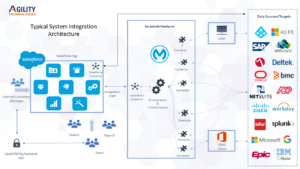What do manufacturing companies, healthcare providers, and fast food retailers have in common? They all need to access data to deliver on mission-critical and time-sensitive initiatives. Manufacturing companies need ERP data to make sure that the supply chain is on track, for example to stock up retailers. Hospitals need EHR data to more effectively triage patient requests for medical testing. Restaurants are entering a new ecosystem of food delivery applications and connecting their backend systems to these apps for data, such as orders, offers, and location. Today more than ever, integration is critical to keeping organizations and communities moving forward.
Getting ahead of disruption with integration
In an increasingly digital world, the number of apps, data, and devices continues to rise and disruption never seems to stop. Major world events and crises, such as COVID-19, forever change customer habits and impact existing value chains. With the COVID-19 pandemic, companies globally are facing unprecedented disruption to their business and operations. Companies are experiencing new and existing challenges, such as ensuring business continuity, empowering the digital workforce with new ways of working, and undergoing technology transformation.
To survive these conditions, companies must act prudently yet aggressively to minimize the impact to their business and operations. However, some companies are struggling to adapt as their IT teams and technology stacks aren’t equipped to change this fast. Integration is key to enabling digital capabilities and transforming IT operations to increase their speed and agility for today and the future. By being able to connect their data from any system, companies can transform IT to be more responsive, resilient, and efficient.
Prioritizing your investment in integration
Companies embracing the opportunity to lead through this crisis will be balancing both short- and long-term thinking, along with strategic decision-making. They will evaluate quickly what’s necessary to keep the lights on in the near term. At the same time, they will need to consider building future-proof foundations to ensure their organizations emerge from this crisis in a better position to sustain and withstand any disruption. There will be a deep reliance on digital capabilities to support internal operations and customers like we’ve never seen before. As a result, CIOs and IT leaders will be considering strategic investments in integration to help support the unprecedented demand for digital capabilities in the near term and to drive their companies’ competitive advantage in the long term.
As IT groups look to implement an integration strategy, they will need to gain support from their organization to prioritize integration by communicating its value in a clear and compelling way. While powerful business cases are an essential tool for evaluating high-value solutions, benefits realization is often left to the enterprise customer to figure out. However, MuleSoft’s Mobilize Consulting team takes a disciplined approach to help customers extract value from Anypoint Platform by focusing on their organization’s strategic goals and highest priority business outcomes.
Measuring the value of integration
MuleSoft’s Mobilize Consulting group’s collaborative value assessment (CVA) methodology has been reviewed and validated to be rigorous and effective by Omdia (formerly Ovum), a global technology research powerhouse. The rigor shown by the Mobilize Consulting group gave each customer interviewed by Omdia a high degree of confidence that these benchmarked improvements could be achieved with Anypoint Platform:
- 64% faster integration project delivery
- 65% higher developer and IT productivity
- 63% reduction in integration maintenance and change costs
- 89% improvement in scale and resource utilization
- 86% reduction in deploy and run costs
The ability for customers to achieve the above benefits that transform IT to become more agile, resilient, and efficient is crucial for organizations to adapt to change in the near term and the long term. Anypoint Platform allows businesses to integrate systems and unify data with reusable APIs, so they can easily compose connected experiences while maintaining security and control. According to the Omdia analyst report, the reusable APIs built on Anypoint Platform accelerate digital transformation and enable businesses to adapt rapidly in an environment where change is happening in increasingly compressed timescales.
Get started
Download the Omdia analyst report, MuleSoft provides a rigorous approach to benefits realization in Anypoint Platform deployments to learn more about MuleSoft’s CVA methodology and approach to helping companies realize their desired business and technical outcomes. To help articulate the ROI of integration, use MuleSoft’s framework mentioned in the analyst report and based on insights from thousands of customers here.
*** This was originally posted by Brandon Cohan on April 15, 2020 on MuleSoft Blog. To see the original post click this link.

